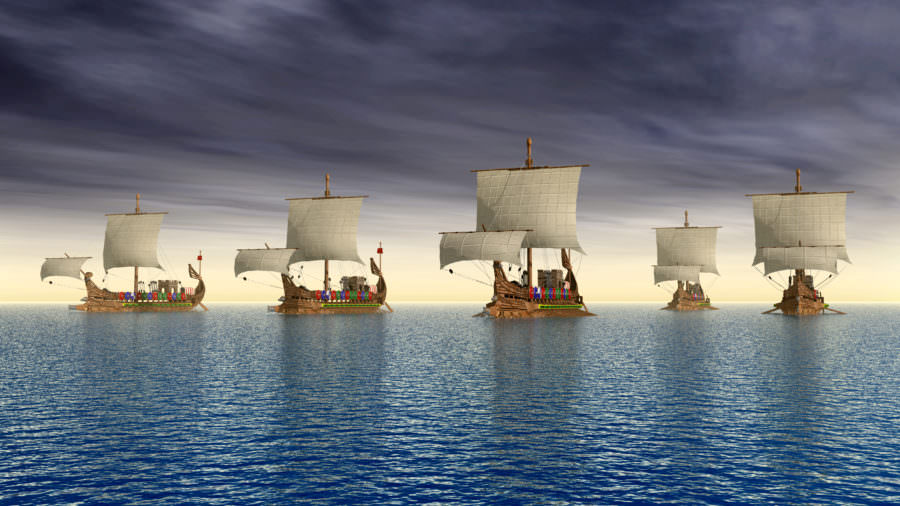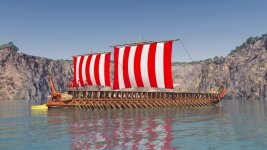Menu
Install the app
How to install the app on iOS
Follow along with the video below to see how to install our site as a web app on your home screen.
Note: This feature may not be available in some browsers.
You are using an out of date browser. It may not display this or other websites correctly.
You should upgrade or use an alternative browser.
You should upgrade or use an alternative browser.
Greek History Community
What was the naval battle style in Ancient Greece?
- Thread starter redsoxdw_
- Start date
1 - 3 of 3 Posts
k_tsoukalas
Administrator
The Navy and Army are two totally different things. Athens developed a formidable army after the First Persian Invasion and they had a unique type of ship in their fleet, as well as winning battle strategies. Here's a good article with an overview:

 www.greekboston.com
www.greekboston.com

Developing the Athenian Navy of Ancient Greece
Learn all about how the ancient Athenian Navy came about in Ancient Greece.
1 - 3 of 3 Posts
JOIN THE DISCUSSION AND READ OTHER GREEK INFO:
Learning about the Spartan way of life
- dimi_pat
- Greek History Forum
- Replies: 1
I find the Spartans fascinating. They seemed to have a different way of life!
The Spartans, known for their military might, also led a lifestyle that was remarkably disciplined and focused on simplicity.
The core of Spartan society was its military-oriented ethos. From a young age, Spartan boys were trained to be soldiers in the agoge, a rigorous education system that emphasized physical training, endurance, and survival skills. This preparation was not just about warfare but about creating individuals who were resilient, self-sufficient, and disciplined.
But Spartan discipline extended beyond the military sphere. Spartans lived a life of austerity and frugality that is quite alien to our modern way of living. Meals were simple, homes were unadorned, and luxuries were frowned upon. This was not out of a lack of resources but a deliberate choice to avoid softness and dependency on material comforts.
Interestingly, this Spartan simplicity also fostered a sense of equality among citizens. By eschewing luxury, Spartans aimed to reduce divisions within their society. Wealth and status were downplayed, while military prowess and moral integrity were valued above all.
What do you guys think about this or what can you add to my thinking?
The Spartans, known for their military might, also led a lifestyle that was remarkably disciplined and focused on simplicity.
The core of Spartan society was its military-oriented ethos. From a young age, Spartan boys were trained to be soldiers in the agoge, a rigorous education system that emphasized physical training, endurance, and survival skills. This preparation was not just about warfare but about creating individuals who were resilient, self-sufficient, and disciplined.
But Spartan discipline extended beyond the military sphere. Spartans lived a life of austerity and frugality that is quite alien to our modern way of living. Meals were simple, homes were unadorned, and luxuries were frowned upon. This was not out of a lack of resources but a deliberate choice to avoid softness and dependency on material comforts.
Interestingly, this Spartan simplicity also fostered a sense of equality among citizens. By eschewing luxury, Spartans aimed to reduce divisions within their society. Wealth and status were downplayed, while military prowess and moral integrity were valued above all.
What do you guys think about this or what can you add to my thinking?
Information About Alexander the Great
- nadellii
- Greek History Forum
- Replies: 1
I have always been fascinated by Alexander the Great. I have this sense that depending on how you look at what he did, you could see it differently.
Sure, he conquered and spread hellenism. But what about the place he conquered? How did they feel? I am guessing not very favorable towards him.
If found this documentary on YouTube created by the history channel. I thought I'd watch it. I found it interesting and wanted to share.
Sure, he conquered and spread hellenism. But what about the place he conquered? How did they feel? I am guessing not very favorable towards him.
If found this documentary on YouTube created by the history channel. I thought I'd watch it. I found it interesting and wanted to share.
Learning about Greek Independence Day
- cubrinj
- Greek History Forum
- Replies: 1
March 25th marks a significant celebration in Greece, but I realize my knowledge on its historical context is quite limited.
From what I understand, this day commemorates the start of the War of Greek Independence in 1821, where Greece sought to end several centuries of Ottoman rule. However, I'm eager to learn more about the intricacies of this period, the key figures involved, and how the struggle for independence unfolded over time.
Additionally, I'd be interested in understanding how this day is celebrated across Greece today and whether any particular traditions are tied to it. For example, are there specific ceremonies, parades, or family traditions that uniquely mark this day in Greek culture?

From what I understand, this day commemorates the start of the War of Greek Independence in 1821, where Greece sought to end several centuries of Ottoman rule. However, I'm eager to learn more about the intricacies of this period, the key figures involved, and how the struggle for independence unfolded over time.
Additionally, I'd be interested in understanding how this day is celebrated across Greece today and whether any particular traditions are tied to it. For example, are there specific ceremonies, parades, or family traditions that uniquely mark this day in Greek culture?

Greek Independence Day History
- redsoxdw_
- Greek History Forum
- Replies: 1
Greek Independence Day is coming up! I thought I would share a bit that I know about the history. Please chime in with corrections or anything to add!
- The Spark of Revolution: Greek Independence Day marks the day in 1821 when the Greeks began their revolt against the Ottoman Empire, a state that had controlled Greece for nearly 400 years. This revolt was influenced by the surge of nationalism throughout Europe and inspired by the Enlightenment ideals of liberty, equality, and fraternity.
- A Poet’s Declaration: The revolution officially began after Bishop Germanos of Patras raised the Greek flag at the Monastery of Agia Lavra in Peloponnese, symbolizing the call to arms. However, it was rumored that the war of independence was actually declared a few days earlier by Alexandros Ypsilantis, a Greek national hero, in the Danubian Principalities.
- International Support: The Greek fight for independence was not just a local effort; it garnered substantial international support from prominent figures such as Lord Byron from Britain, who notably spent his own money and later died in Greece, contributing to the Greek cause. This international backing was crucial for the morale of the Greek fighters and helped in diplomatic efforts later on.
- The Battle of Navarino: A pivotal point in the Greek War of Independence was the Battle of Navarino in 1827, where the combined fleets of Britain, France, and Russia defeated the Ottoman and Egyptian fleets. This naval battle marked a significant turning point that led to the eventual independence of Greece.
- Recognition and Autonomy: Greek Independence was formally recognized in 1830 by the Treaty of London. However, full sovereignty and the delineation of the Greek borders were not achieved until later. It allowed the foundation of the modern Greek state, under the governance of King Otto from Bavaria.
Family Trees
- Rízes Hellenic Genealogy
- Greek History Forum
- Replies: 0
Hey fellow members,
As we traverse the rich tapestry of Greek culture and history on this platform, I've been pondering something quite fascinating: our family histories. How many of us have delved into the intricate branches of our family trees?
Genealogy, the study of family history and lineage, often unveils captivating stories, connections, and traditions passed down through generations. Whether you're just beginning to trace your ancestry or have been meticulously documenting it for years, I'd love to hear about your experiences.
Here are a few questions to spark our discussion:
Looking forward to our discussion,
RizeGen
As we traverse the rich tapestry of Greek culture and history on this platform, I've been pondering something quite fascinating: our family histories. How many of us have delved into the intricate branches of our family trees?
Genealogy, the study of family history and lineage, often unveils captivating stories, connections, and traditions passed down through generations. Whether you're just beginning to trace your ancestry or have been meticulously documenting it for years, I'd love to hear about your experiences.
Here are a few questions to spark our discussion:
- What inspired you to start researching your family history?
- Have you encountered any unexpected discoveries or fascinating tales along the way?
- What resources or tools have you found most helpful in your genealogical journey?
- Do you have any tips or advice for someone interested in starting their own family tree?
Looking forward to our discussion,
RizeGen
Share and discuss Greek history!
WorldwideGreeks.com is a free online forum community where people can discuss Greek food, travel, traditions, history and mythology.
Join Worldwide Greeks here!
Join Worldwide Greeks here!
JOIN COMMUNITY FOR FREE
LOGIN TO YOUR ACCOUNT



